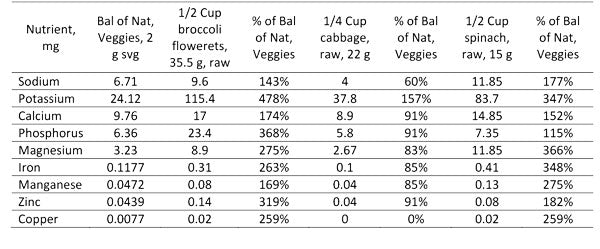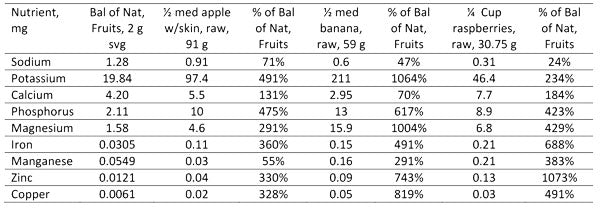by Michael Donaldson, PhD
Can the daily recommended servings of fruits and vegetables fit into just six capsules? Balance of Nature says, “Yes!” But, like the old saying goes, “In God we trust. All others must show data.” So let’s investigate this claim a little bit closer.
At Hallelujah Diet we stress the importance of eating fruits and vegetables. We practice what we preach and eat lots of them. In fact, an analysis of the Hallelujah Diet back in 2001 showed that followers of the Hallelujah Diet consumed over 6 servings of fruits and 11 servings of vegetables a day(1). And that was without counting BarleyMax. A more recent analysis showed very similar results—over 700 grams of fruits and 1,000 grams of vegetables per 2,000 calories. Another nutrient-dense diet, the Wahl’s Diet, recommends over 650 grams of fruits and almost 800 grams of vegetables per 2,000 calories. Obviously, this is more than the government will admit to you needing—their recommendation is a paltry 260 grams of non-starchy vegetables and 360 grams of fruits per 2,000 calories. So, the amount of fruits and vegetables you need to be healthy is on the order of 1½ pounds of fruits and 2 pounds of vegetables a day. Try to put that into 6 capsules.
So, why eat so many fruits and vegetables? Simply put, life comes from life. Living foods supply the nutrients and vitality that our living bodies, made up of living cells, require. Eating more fruits and vegetables leads to less disease of all sorts. The more you eat, the better you feel. We do eat cooked food as well, including starchy vegetables, organic whole grains, legumes, nuts and seeds as well on the Hallelujah Diet. But fruits and vegetables are a huge part of what we eat from day to day.
So, back to the main question—can the daily recommended servings of fruits and vegetables fit into six capsules? No matter what you define as the “daily recommended servings of fruits and vegetables” the answer is, “NO.” I will share with you three lines of evidence to back up this answer: (1) Vitamin C testing, (2) Enzyme activity testing, and (3) Mineral analysis.
Vitamin C
Vitamin C is a crucial nutrient coming almost exclusively from fruits and vegetables. Unlike most mammals, humans, fruit bats, primates and guinea pigs do not synthesize their own vitamin C. We must eat it. Vitamin C tends to be heat labile, meaning it is not stable under heat. Fresh vegetables and especially fresh fruits supply the vitamin C that we need every day. If a product would supply our “daily recommended servings of fruits and vegetables” it would need to have a substantial amount of vitamin C in it, as the government says we need between 75 and 90 mg a day. It probably is way more than that, but 90 mg would be a good start.
So, a laboratory test for vitamin C was conducted on a fresh batch of Balance of Nature Veggies and Fruits. A 3-capsule serving of Veggies (2 grams of powder) contains 0.097 mg of vitamin C, while a 3-capsule serving of Fruits contains 0.307 mg of vitamin C. The whole bottle of Balance of Nature Veggies contains less than 9 mg of vitamin C. Ten bottles of Veggies would still not get you to 90 mg of vitamin C. The whole bottle of Balance of Nature Fruits contains about 27 mg of vitamin C, so if you ate 3 bottles a day you would almost get your vitamin C needs met. Needless to say, you will never see a claim of “excellent source of vitamin C” or even “good source of vitamin C” on a bottle of Balance of Nature Fruits or Veggies. That is a legal claim that they could never meet.
When you compare the amount of vitamin C from the capsules of Balance of Nature with the amounts in raw vegetables and fruits, you can see that the capsules fall far short of what you get from eating actual raw fruits and vegetables. Some of the top ingredients in the Fruits product are apples, bananas, and raspberries and some of the top ingredients in the Veggies products are broccoli, cabbage and spinach. Take a look at Table 1 for a vitamin C comparison. Even relatively small amounts of broccoli, cabbage and spinach have 40-340 times as much vitamin C as the Veggie capsules. And apples, bananas and raspberries, none of which are extremely high in vitamin C, have 13-26 times as much vitamin C as the Fruits capsules.
Vitamin C? A swing and a miss for Balance of Nature. Strike One!
Table 1. Vitamin C content of Balance of Nature Veggies and Fruits in Comparison with Raw Produce.

Enzyme Activity
Enzymes are associated with the vitality of raw, living foods. When you cook a fruit or vegetable the enzyme activity disappears. Even gently heated produce begins to lose its enzyme activity quickly.
For this test, acid phosphatase was used as a marker of enzymatic activity. This enzyme is fairly heat stable and is usually abundant in all fruits and vegetables that I have tested over the years. The procedure used for this test is carefully explained in the recent testing of household juicers(2). A comparison of the results of the enzyme testing, along with a comparison with the results from fresh juice is given in Table 2.
Table 2. Comparison of Acid Phosphatase Activity in Balance of Nature Capsules.

The Balance of Nature Veggies has 7.1 U/g of acid phosphatase activity, while the Fruits have 0.79 U/g. To put this into perspective, I asked, “How many capsules would it take to equal the same amount of acid phosphatase activity in 1 tablespoon of fresh juice?” I have published the acid phosphatase activity in carrot, apple, celery and spinach juice(2), so it is easy to make this comparison.
Well, it takes about 4 capsules of the Veggies to get the same amount of enzyme activity as found in 1 tablespoon of carrot juice. Not 1 cup, not even 1 ounce. Just 1 tablespoon. A tablespoon of celery juice is equal to 2.2 capsules of Veggies. Celery isn’t known to be really nutrient dense. But spinach is quite potent. It would take 40 capsules of the Veggies to equal the acid phosphatase activity of just 1 tablespoon of spinach juice. Those Veggie capsules are looking pretty empty about right now.
The Fruit capsules have only about 11 percent of the activity of Veggies capsules, so the numbers are all about 9 times as high. Apple juice isn’t very nutrient dense, but it still would take 9 capsules of the Fruit product to equal the enzyme activity of just 1 tablespoon of apple juice.
Are the Balance of Nature products good sources of raw nutrition? No. I guarantee you that there is more enzyme activity in your green smoothie than in a whole bottle of Veggies or Fruits, let alone your “daily recommended amount of fruits and vegetables.”
The Balance of Nature Veggies and Fruits are woefully inadequate sources of active enzymes.
Enzyme activity? Another swing and a miss for Balance of Nature. Strike Two!
Mineral Analysis
Minerals are critical nutrients as well. Minerals are heat stable. They don’t disappear during cutting, grinding, drying, and bottling of a product. Even when you take out the carbohydrate (the fiber and the sugar) you still have the minerals of the fruits in the powder. You can really tell how much material you started with by examining the mineral content. So, a sample of each product of Balance of Nature Veggies and Fruits was sent to an independent analytical laboratory for the analysis of minerals. The results for the Veggies are given in Table 3, while Table 4 has the results for Fruits.
Table 3. Mineral Comparison of Balance of Nature Veggies with Raw Vegetables.

A half cup of broccoli is considerably more mineral-dense than a serving of Balance of Nature Veggies. Just a half cup of broccoli has almost 5 times as much potassium, almost 2 times as much calcium, almost 3 times as much magnesium, 2.5 times as much iron, and 3 times as much zinc as 3 capsules of the Balance of Nature Veggies. So much for the Veggie capsules replacing your “daily recommended servings of fruits and vegetables.” In fact, the mineral content of the Veggie capsules is close to what you find in ¼ cup of green cabbage. But raw spinach blows out the competition (you should see the kale comparison!). A half cup of raw spinach leaves has 3.5 times as much potassium, 1.5 times as much calcium, 3.5 times as much magnesium, 3.5 times as much iron, almost double the amount of zinc and 2.5 times as much copper.
The Balance of Nature Fruit capsules aren’t any better in comparison with raw fruit. For comparisons apples, bananas and raspberries were chosen, all of which are ingredients in the Fruit capsules. But the capsules don’t contain very much fruit at all. Half of a medium apple has almost 5 times as much potassium, almost 5 times as much phosphorus and almost 3 times as much magnesium, 3.5 times as much iron and more than 3 times as much zinc as a serving of 3 Fruit capsules. One half of a banana (who only eats ½ a banana?) has 10 times as much potassium, six times as much phosphorus, 10 times as much magnesium, 5 times as much iron, 7 times as much zinc and 8 times as much copper as the serving of Fruit capsules. And ¼ cup of raspberries has more than double the amount of potassium, almost double the amount of calcium, 4 times as much phosphorus, 4 times as much magnesium, almost 7 times as much iron, 10 times as much zinc and 5 times as much copper. In fact, these common fruits look like superfoods next to the Balance of Nature Fruit capsules.
Table 4. Mineral Comparison of Balance of Nature Fruits with Raw Fruits.

Minerals? Balance of Nature takes another swing and a miss. Strike Three! You’re OUT!!
Balance of Nature has struck out. We could go on and analyze and compare even more, and we would find that Balance of Nature doesn’t have much nature in it, and it won’t add hardly anything to your balance of fruits and vegetables. A 6-capsule serving is worth about a ¼ cup of cabbage and a small slice of apple. The only balance going on is your bank balance going to theirs. This company is a marketing sham. While the products themselves might be OK (but not as good as what we sell for much less) they are overpriced and cannot deliver what they promise. It is impossible to deliver all of the goodness and benefits of your daily servings of fruits and vegetables in just 6 capsules.
If Balance of Nature wanted to give people a real value and earn some trust, which they have lost completely after this analysis, they would pack their veggie and fruit powders as loose powders in jars with a 10-gram scoop. They would then put an honest Supplement Facts label on it with nutrient information included, and they would sell it at a price that is competitive with other products. And they would stop trying to tell you that it is anything more than a dietary supplement that is a convenient source of veggies and fruits.
References:
1. Donaldson MS (2001) Food and nutrient intake of Hallelujah vegetarians. Nutr Food Sci 31:293–303. doi:10.1108/00346650110409128
2. Donaldson M (2020) Household Juice Extractor Comparison and Optimization. J Food Process Technol 11:1–14. doi:2157-7110.20.11.819
The post Balance of Nature Analysis and Report appeared first on Plant-Based Diet - Recipes & Weight Loss Supplements | Hallelujah Diet.
Hallelujah Diet Blogger
Comments
Post a Comment